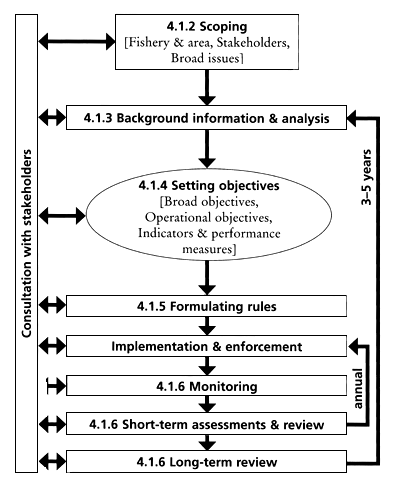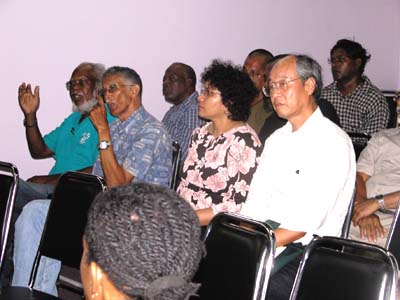DEVELOPING AN EAF MANAGEMENT PLAN
This section provides guidelines for producing and revising management plans within EAF. The management plan should be a formal or informal arrangement between a fishery management authority and stakeholders and should have the following components:
Title
Background
To include:
- social and institutional aspects
- description of fishing activity, resources and the ecosystem
- ecological issues and challenges
Objectives
To include:
- operational objectives
- reference points
- performance measures for the fishery
Management measures
Description of the agreed measures to regulate fishing to meet all the objectives within the agreed time frame (e.g. the details of any gear restrictions, closed areas or seasons, days at sea or allowable catches and size limits).
Decision rules
Rules for deciding on the management measures (e.g. how much effort to allow or the size of a total allowable catch in a particular year).
Access rights
Description of the system or systems of access rights used in the fishery.
Evaluation of management
To include a report on the status of stocks including bycatch species, based on risk and stock assessments, state of the ecosystem and social and economic characteristics. Collectively these indicators will demonstrate how effective management has been in the past and will highlight areas where management is failing or greater emphasis is needed.
Monitoring, control and surveillance
Details of the MCS systems used in the fishery.
Communication
The communication strategy and activities planned to keep the stakeholders well-informed on developments in the fishery and management activities.
Review
The details of the next review of the performance of the management of the fishery.
The process of developing and modifying an EAF management plan requires a series of iterative steps, as illustrated in the Figure below. An outline of these steps is provided in the Appendix to this Handbook. While in many cases, sufficient capacity and data will not be available to address all points, the processes outlined are still relevant and will assist in developing effective plans.
| The process that should be followed in developing and implementing a management plan for an ecosystem approach to fisheries. The numbers refer to the sections explaining each step in the FAO Technical Guidelines for Responsible Fisheries. No. 4, Suppl. 2. The ecosystem approach to fisheries. Rome, FAO. 2003.112p. |
 |
It is recommended that there are at least two components to the plan - a higher-level three - to five-year component that states the broad management objectives and measures to achieve them, and another short-term component that specifies the annual cycle of setting and reviewing specific operational objectives, indicators and performance measures.
| The importance of consultation |
| It is imperative that stakeholders are included in all stages of the process through consultation and participation. Stakeholder involvement needs to represent the breadth of views, without the group becoming unmanageably large. Issues related to stakeholder capacity and commitment will also need to be carefully addressed, and formal, transparent and accountable processes set up to allow all parties to work cooperatively. In some cases, logistic constraints may mean that stakeholder inclusion is limited; in these cases, great care will be needed to maintain transparency, credibility and to ensure stakeholder ownership of the outcomes. |

KEVERN COCHRANE, FAO.
Effective consultation is always essential to ensure good outcomes and compliance: consulting with stakeholders in the shrimp and groundfish fisheries of Trinidad and Venezuela.